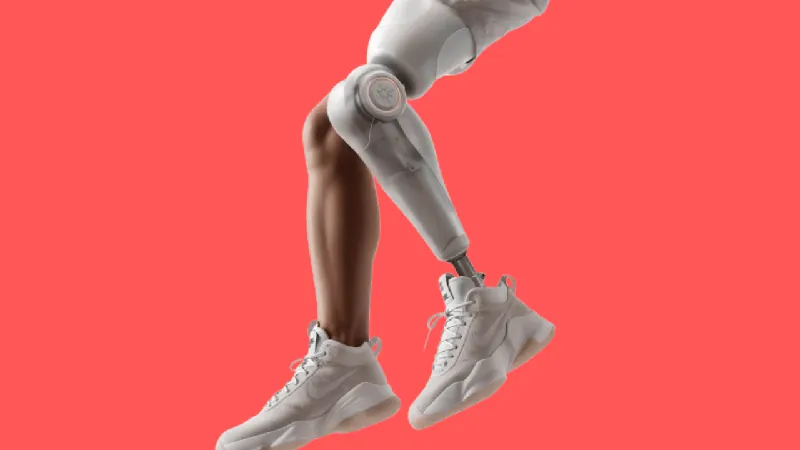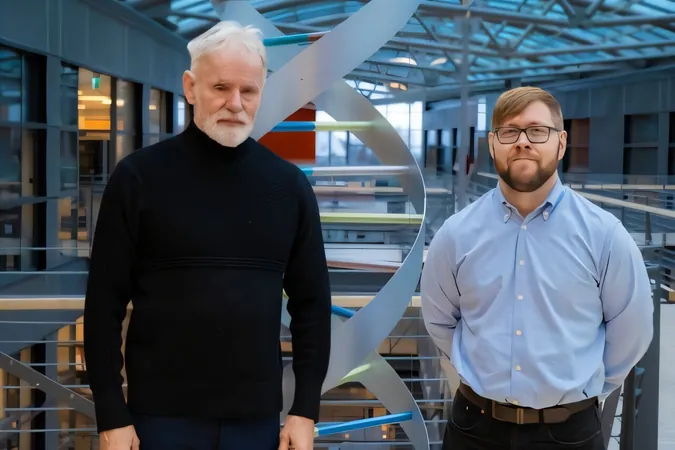
Revolutionizing Mobility: How Ukrainian Startup SYLA is Set to Redefine Prosthetic Knees
2024-11-12
Author: Wei
In a world where conflict often leaves deep scars, the toll on human life includes devastating physical disabilities. In the United States alone, more than 1,500 military personnel have lost limbs due to the wars in Afghanistan and Iraq. Now, as Ukraine grapples with the consequences of its ongoing conflict, estimates suggest a staggering 20,000 to 50,000 amputees may emerge, according to human rights groups like Pryncyp.
Traditionally, prosthetics have presented a host of challenges: exorbitant costs, discomfort, lengthy rehabilitation processes, and the frequent need for replacement, especially for growing children. However, a groundbreaking Ukrainian startup, SYLA, is determined to disrupt the industry with its innovative solutions.
At the recent IT Arena conference in Lviv, I had the chance to connect with SYLA co-founders Mykola Lozinskyi and Ilias Abliakimov. Their company has embarked on a mission to develop an AI-enhanced bionic prosthetic knee that adapts dynamically to the user’s walking pace, enabling an effortless transition from a slow stroll to a brisk sprint.
The startup’s impressive potential earned it a $10,000 prize from the ЗMIN Foundation for being the most impactful initiative showcased at the event. With a talented team of 12 engineers, hailing from backgrounds in electrical, mechanical, and software engineering, SYLA started prototyping in 2023.
"My experience in a biometrics lab at Sevastopol State Technical University ignited my fascination in understanding the mechanics of walking," said Lozinskyi. "We believe everyone deserves the freedom of movement, and we're dedicated to overcoming the limitations of even the most advanced bionic knees."
Prosthetic limbs often come with a hefty price tag in Ukraine—around $50,000—while the U.S. market sees prices soar to $100,000, with the added burden of needing replacements every three years. SYLA’s prosthetic knee offers a glimmer of hope, with material costs estimated at just $5,000, while also boasting superior adaptability and performance.
The SYLA X1 knee is set to empower above-knee amputees, supporting up to 100 kg of weight and ensuring exceptional stability and durability. Unlike existing bionic knees that rely on hydraulic systems, which offer limited adaptability and require manual mode selection, the SYLA X1 harnesses electric motors, microelectronics, and advanced signal processing to deliver real-time responsiveness.
Equipped with advanced sensor technology, including Inertial Measurement Units (IMU) and load cells, this prosthetic continuously tracks the user’s movements, adjusting instantly to changing terrains and walking speeds. With machine learning algorithms integrated, the knee can learn and adapt to the user’s unique walking patterns over time.
One of its groundbreaking features is its modular design which allows easy installation by prosthetists in clinical settings, ensuring perfect customization for patient comfort. SYLA’s innovative approach includes a unique fatigue feature, enabling users to walk temporarily without battery power if needed. With the capability to walk up to 10 km/h, users can expect about 5,000 steps per charge.
Notably, SYLA is exploring regenerative battery technology akin to electric bicycles, where walking could help recharge the battery, further enhancing autonomy.
Lozinskyi emphasized the importance of continuous evolution in their products post-launch. "Our goal is to enhance the prosthetic knee's capabilities through software updates, introducing various movement patterns for lifestyles ranging from hiking to boxing."
With increasing demand for self-expression among amputees, SYLA collaborates with Running Guy Studio to offer textile-dressed prosthetic devices, allowing users to showcase their personalities confidently.
Looking ahead, SYLA aims to begin minimally viable product (MVP) testing with patients in early 2025, collecting critical data on functionality and performance. The initiative signals a significant shift in how we think about prosthetics—moving from mere functionality to holistic rehabilitation and quality of life enhancement.
SYLA is not just creating a product; it’s paving the way for a new era in mobility, where every individual can reclaim their freedom of movement, leaving limitations behind.


 Brasil (PT)
Brasil (PT)
 Canada (EN)
Canada (EN)
 Chile (ES)
Chile (ES)
 España (ES)
España (ES)
 France (FR)
France (FR)
 Hong Kong (EN)
Hong Kong (EN)
 Italia (IT)
Italia (IT)
 日本 (JA)
日本 (JA)
 Magyarország (HU)
Magyarország (HU)
 Norge (NO)
Norge (NO)
 Polska (PL)
Polska (PL)
 Schweiz (DE)
Schweiz (DE)
 Singapore (EN)
Singapore (EN)
 Sverige (SV)
Sverige (SV)
 Suomi (FI)
Suomi (FI)
 Türkiye (TR)
Türkiye (TR)